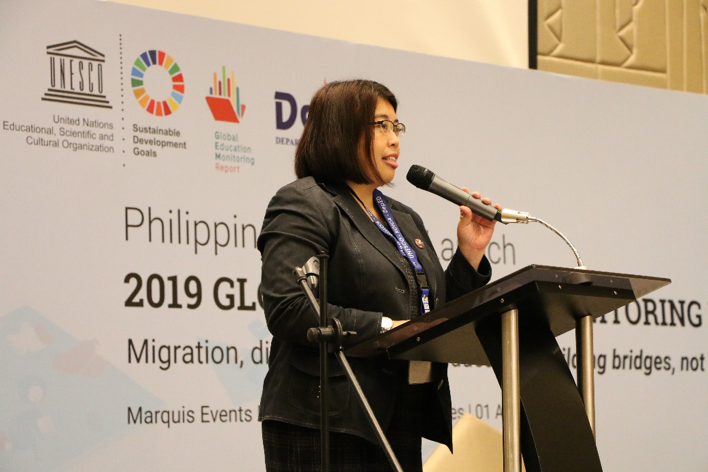UNESCO Jakarta and Partners spearhead National Launch of the 2019 Global Education Monitoring Report in the Philippines
Published: August 1, 2019

The Philippine National Commission for UNESCO (PH NatCom) participated in the launching of the 2019 Global Education Monitoring (GEM) Report, with the theme: Building Bridges, Not Walls, that was held on 1 August 2019 in Bonifacio Global City, Taguig. Key education stakeholders who attended discussed trends and implications of migration and displacement to education, and vice versa. Evidences on gaps in educational systems in the global and national levels were also presented. The UNESCO Jakarta Office and the Department of Education (DepEd), in cooperation with education agencies and other stakeholders, organized the said event.
The Global Education Monitoring (GEM) Report, formerly known as the Education for All Global Monitoring Report (GMR), is an editorially independent, authoritative, and evidence-based annual report that monitors progress in education in the Sustainable Development Goals (SDGs), with special focus on SDG 4 on education.
UNESCO Jakarta Office Director, Dr. Shahbaz Khan, emphasized the importance of the report that contains statistics that countries such as the Philippines can use when it comes to education. While he said that the Philippines is doing good in achieving certain SDGs standards, there is still a need to ensure that the quality of education is the same from one place to another. Furthermore, he said that there is a need for bigger and stronger investment in education to uplift the quality of education and we need to make sure that we reach out to people who are left behind.
During the event proper, Deputy Executive Director II Lindsay Barrientos welcomed the guests by reading the message of Secretary-General Lila Ramos Shahani. Here are some excerpts: “Today, we inhabit a dire historical moment. The notion that “education is a fundamental human right” should be made more real than ever. Despite being guaranteed in the Universal Declaration of Human Rights (Article 26), in practice, there are restrictive education policies and school administrative rules that prevent the fulfilment of this right. We must do better for migrants who remain unsung heroes in facing violence the world over. This is why we laud the efforts of the UNESCO Office in Jakarta and the DepEd for the 2019 Global Education Monitoring (GEM) Report. This book will certainly open our eyes to the plight of millions of refugees and displaced learners, who continue to fight for a fundamental right to education. It covers policy concerns and recommendations that address administrative or bureaucratic challenges preventing migrant learning. It also provides examples of implementing intercultural curricula that promote tolerance, inclusion, and diversity. Inclusion in national education systems can also be strengthened through assessing existing skills of students. Most importantly, the report also provides helpful insights on how to assist and prepare school administrators and teachers in dealing with diverse classroom settings. It is crucial because teachers play an important role in creating safe, supportive and interactive environments that promote social cohesion. The mantra of the 2030 Agenda for Sustainable Development is to “leave no one behind.” So we must all expand our horizons to reach those people who often “fall through the cracks.” This is why UNESCO’s role is so critical since we have the mandate to convince governments to make education a priority for all, especially for the migrants in our many communities.
In her keynote address, DepEd Secretary Leonor Briones stressed that all of the countries are homes for various sets of migrants. The Philippine case is not an exception. She shared that our country has rich experience in sending and hosting migrants. The number of overseas Filipino workers (OFWs) and historical accounts of providing refuge to Jews during World War I, and boat people of Viet Nam during their Civil War are proofs of this. It is in this context that she reminded everyone to look at the bigger picture when being critical about the Philippine case in addressing migrant issues. She affirmed, however, that these issues have become more serious as migration and displacement are exponentially increasing. Migration impels economic demands, and consideration of economic factors shall be towards improving the status of affected people. She noted that the problem on displacement is an urgent concern because of its impact on education. It uproots children from their homes, schools and the environment that they were used to. At present, there are thousands of children that are affected by illegal migration who do not have identities and no awareness of their own self and origin. She also mentioned her Department’s initiatives to make situations of displaced people better such as enhancing the Alternative Learning System (ALS) Program by strengthening their reach to children in conflict with the law. Moreover, the Department also incorporates Global Citizenship Education (GCED) in its processes. Furthermore, the DepEd also focuses on including remote schools in their matrix planning to ensure that they are not being left behind.





